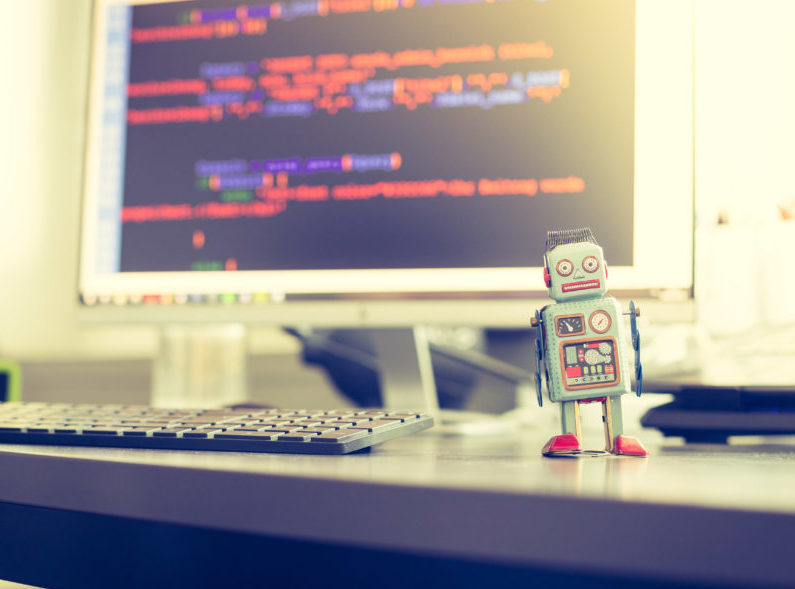Chatbots have an important role to play in the future of HR — the software robots are not the be-all-end-all solution though.
The modernisation of HR — necessary in organisation-wide digital transformation efforts — requires a combination of chatbots, robotic process automation (RPA) and continued human involvement.
Chatbots: part of the HR solution
Currently, HR professionals in large organisations can spend “a lot of time on the phone, chatting with employees and so on,” says Julie Provino, MD, International HR director at VeryHR. These tasks can be mundane and are ripe for autonomous disruption.
Chatbots, combined with technologies such as artificial intelligence, are advancing. The software is becoming more malleable, more aware of human emotion and more capable of being able to respond to employees directly.
“Now, it’s much easier to go on a website, internally or externally, click chat and have a direct response,” continues Provino. “That leaves the HR professional to actually focus on other things, which are more important to businesses. I’m a firm believer in any type of software that can give us more intelligence about employee behaviour, potential talent and compliance standards” — all in the pursuit of making employees lives easier, while providing more of an analytical view of what’s happening in a business.
Chatbots — key in improving customer engagement, retention and experience
We always hear that introducing a new technology, in this case chatbots, will help free humans up for less mundane tasks — as mentioned above. But, what exactly are these tasks? From an HR perspective, the introduction of chatbots means that HR professionals can focus more on management training. “Often managers or leaders have a title but do not always understand their role as people managers,” confirms Provino. “There’s a big lack of knowhow in that environment.”
Often, HR has to step in and manage employees on behalf of other managers in the business, who need to realise they are part of the whole and not an individual. Software automation presents a great opportunity to produce a more wholesome approach to the team dynamic, alongside partnering with leadership and managers to improve employee wellbeing, performance, engagement and motivation.
It’s become increasingly tricky to manage people, especially the new generations and their changing employee demands.
“We live in an age where anyone can communicate anything to anybody on the internet, which can cause problems for companies” — Provino
There’s a lot on the HR agenda and having chatbots to support this function on a basic level can free up time spent on the human side of people management.
Chatbots will never replace the human, they will never be as good — they’re not there to build a relationship, they’re not there to follow up or ask the more personal questions.
So, what is the chatbot’s purpose? To answer general employee queries and free up the the HR professional — unglamorously.
RPA in HR
RPA is another big tool that help save time and avoid human mistakes. Nowadays, you can teach a robot to sift through CVs, coordinate interviews, oversee the applicant tracking systems and even look after the payroll — all with the click of a button, regardless of the size of your company. Implementing RPA represents a significant advantage, one that can help spur digital transformation.
RPA: we take a look at UiPath, Blue Prism and Automation Anywhere
“It’s one of the really exciting pieces coming into the HR world,” says Provino. “It means, however, that HR professionals need to become a lot more tech-savvy on what’s out there and all the potential that they have at their fingertips.”
Ease of use is also critical. In general, HR professionals are not technologically-savvy by nature. So, for those vendors that offer software for HR, they need to understand how to speak HR’s language and make RPA solutions as easy to use as possible.
“My fear is that HR will forget about the human aspect that needs to happen within business” — Provino
HR’s role in digital transformation
HR has important role to play in organisation-wide transformation.
Successful digital transformation depends on the employee experience. And the more efficient the HR function, the better that experience is. Efficiency in this case can be derived from the introduction of software automation technologies in HR, such as chatbots and RPA.
A modernised HR department will create agile workforces, adopt channel agnostic approaches to recruitment, develop their own talent pools and instil cultures of continuous learning across their workforces
“I think we can spearhead the whole process,” continues Provino. “It’s very easy to hide behind a system of software, but I think HR needs to step out of its comfort zone and lead this movement. It’s about embracing technology and embracing change.”







